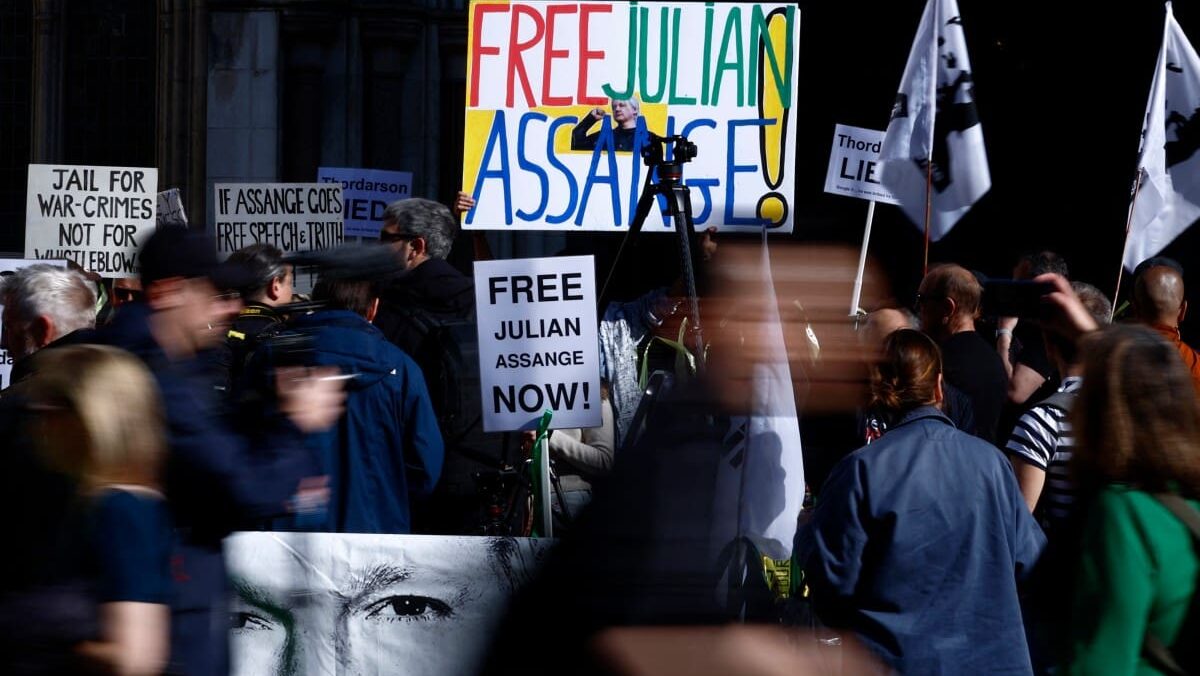
Supporters of WikiLeaks founder Julian Assange hold banners and placards as they protest in support of him, outside The Royal Courts of Justice, Britain’s High Court, in central London on May 20, 2024. Wikileaks said in a statement Monday that Assange’s release “is the result of a global campaign that spanned grass-roots organisers, press freedom campaigners, legislators and leaders from across the political spectrum.”
Photo: BENJAMIN CREMEL / AFP
The U.S. has agreed to drop 18 espionage charges against journalist Julian Assange after he reached a plea deal over his WikiLeaks disclosures from almost 15 years ago.
Assange was freed from Belmarsh prison on June 24th, where he had spent more than five years (1,901 days) in a 6.5-by-10 foot cell, isolated 23 hours a day. Before this, he sought asylum in the Ecuadorian embassy in London for seven years while fighting extradition to the U.S.
His lawyers had claimed that if he was extradited, the WikiLeaks founder could have faced a prison term of up to 175 years. Assange’s few supporters in the British media also warned that extradition would likely have led to him being “buried alive in some federal dungeon, the sort of place intended for mass murderers or terrorists.”
The U.S. Department of Justice has now agreed to only charge Assange with conspiracy to obtain and disclose national defence information in relation to his publishing of hundreds of thousands of leaked documents concerning the Afghanistan and Iraq wars.
Assange’s plea and sentencing is scheduled for Wednesday, June 26th, at a U.S. court in the Northern Mariana Islands. Prosecutors have agreed to a sentence of five years, but have said the time already served in Belmarsh will count against this. This means Assange should walk free after sentencing.
The WikiLeaks founder was filmed boarding a flight from Stansted Airport on Monday before landing in Bangkok for refuelling.
Approaching Bangkok airport for layover.
— WikiLeaks (@wikileaks) June 25, 2024
Moving closer to freedom.#AssangeJet pic.twitter.com/QGWZvSFhQD
From there, he will travel to the Northern Mariana Islands to sign documentation and should afterwards fly to Australia, at the personal cost of $500,000 (€466,000).
Julian’s wife, Stella, said his family is waiting for him there, and that his children, who have only ever known him behind bars, do not yet know he is free.
All I told them was that there was a big surprise on the morning that we left. I told them we were heading to the airport. And we got on the plane and I told them that we were going to visit our family, their cousin, their grandfather and so on. And they still don’t know.
We’ve been very careful because obviously no one can stop a five and a seven-year-old from, you know, shouting it from the rooftops at any given moment. And because of the sensitivity around the judge having to sign off the deal we’ve been very careful, just gradually, incrementally telling them information. They are very excited to be in Australia though.
The case against Assange’s extradition has moved quickly in recent months. WikiLeaks said that his coming freedom “is the result of a global campaign that spanned grass-roots organisers, press freedom campaigners, legislators and leaders from across the political spectrum, all the way to the United Nations. This created the space for a long period of negotiations with the U.S. Department of Justice, leading to a deal that has not yet been formally finalised.”
JULIAN ASSANGE IS FREE
— WikiLeaks (@wikileaks) June 24, 2024
Julian Assange is free. He left Belmarsh maximum security prison on the morning of 24 June, after having spent 1901 days there. He was granted bail by the High Court in London and was released at Stansted airport during the afternoon, where he boarded a…
Stella said that the next step is to get Julian “healthy again.” “He’s been in a terrible state for five years,” she claimed, adding that an “emergency fund” was being established “for Julian’s health and recovery.”
Julian’s wife also asked followers of his case to “please follow [the flight carrying him from Bangkok] … we need all eyes on his flight in case something goes wrong.”
Commenting on reports of Assange’s freedom, Prospect editor Alan Rusbridger said this was “good news” because “enough was enough,” but added:
His treatment was a warning to journalists and whistleblowers to keep quiet in future. And I suspect it will have worked.
